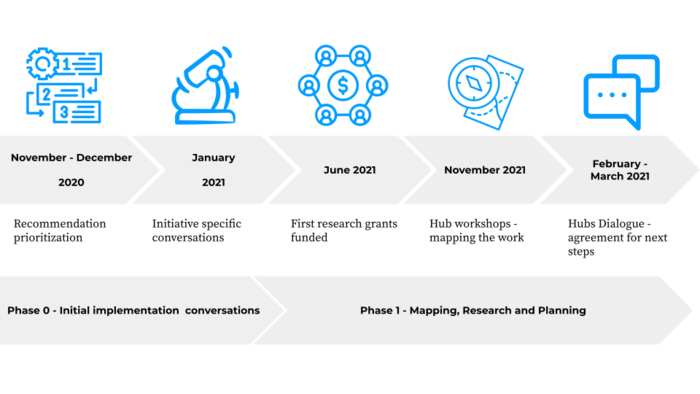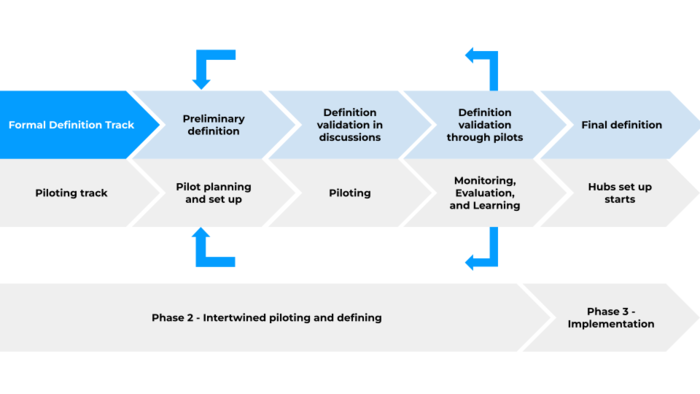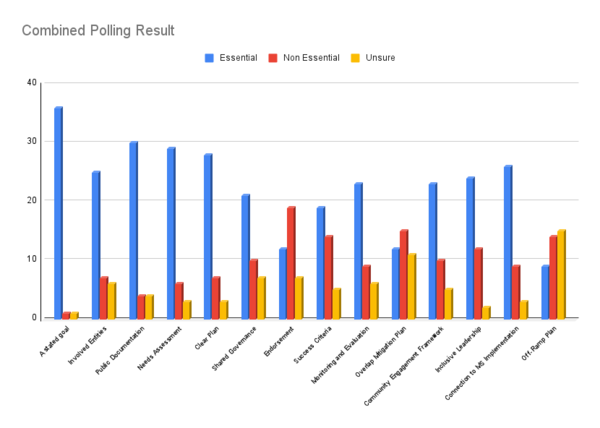Hubs/Documentation/June 2022 Global Conversations/ru
Мероприятие «Глобальные обсуждения региональных и тематических хабов» в июне 2022 года длилось три дня в трех часовых поясах 24, 25 и 26 июня 2022 года. В течение 3 дней 68 человек с разным образованием и опытом со всего Движения приняли участие в обсуждениях. Наиболее представленными регионами Движения были Африка и Европа, в то время как из Центральной и Южной Азии участие было недостаточным.

Цель мероприятия — улучшение общего понимания последствий пилотирования хабов,
- путём содействия достижению согласия по ранее опубликованному документу минимальных жизнеспособных критериев для пилотирования хабов, и
- использование пространства для обсуждения проблем и обмена мнениями.
Мероприятие проводилось с целью сбора информации для улучшения предложенных Минимальных критериев для пилотирования хабов и определение открытых вопросов для обсуждения.
Участие в мероприятии было открытым с возможностью предварительной регистрации. В результате, все желающие могли принять участие в обсуждении вопросов о хабах, независимо от их фактического намерения начать или продолжить работу над региональным или тематическим хабом.
Framing the Conversation
Структура обсуждения была представлена командой по Стратегии и управлению движением Фонда Викимедиа, а именно Каарелом Вайдлой, который фасилитирует процесс создания региональных и тематических хабов. Он предоставил дополнительный контекст относительно разработки Минимальных критериев пилотирования хабов, а также цели этих критериев.
На презентации была представлена "хронология предыдущих обсуждений" региональных и тематических хабов, которые начались в ноябре 2020 года. Содержание критериев является сводкой этих обсуждений.

Один из ключевых спорных моментов из предыдущих обсуждений: С одной стороны, необходимо достичь согласия во всем движении относительно определения и концепции хабов, а с другой стороны, некоторые группы нуждаются в немедленной реализации своей структуры хаба. Поэтому была предложена "схема параллельного цикла определения и пилотирования":

Кроме того, были разъяснены некоторые аспекты, касающиеся теоретической основы пилотирования, включая реализацию принципа субсидиарности и комплексный менеджмент с использованием safe-to-fail probes. Цель минимальных критериев пилотирования была резюмирована следующим образом:
- Ensuring that the practical experimentation around hubs does not deviate too far from the work of defining Hubs.
- Ensuring that there is visibility into the piloting work with movement level accountability.
- Ensuring sufficient level of agreement on Hubs as not to stop the natural growth of structured collaborations.
Content Discussions
The discussion portion of the 120 minute event was split into 2 parts focusing on different areas of the proposed Minimum Piloting Criteria:
- Validation of the Hub Pilots, i.e. discussing the role of different movement entities in the hub pilot validation cycle
- Conversation on the Minimum Criteria, i.e. polling which of the proposed criteria are essential and which are non-essential for piloting of the hubs, followed by a deeper discussion regarding key aspects.
Conversation I - Validation of Hub Pilots
The first part of the event was dedicated to the section of validation of hub pilots. The goal of that discussion was to identify Stakeholders needed in the approval process of hub pilots. The proposed stakeholders in the Minimum Piloting Criteria were surfaced from the prior discussions on hubs:
- The Movement Strategy and Governance Team in Wikimedia Foundation - supports the participation of Wikimedia communities and affiliates in the Movement Strategy initiatives through process facilitation, community support and engagement activities. This includes movement governance initiatives such as Movement Charter and Regional and Thematic Hubs.
- The Community - In the context of the Movement Strategy it refers not only to content contributor communities but rather to all members of our Movement. It must be acknowledged that the Movement in its diversity comprises many communities and there is not one community that every single person subscribes to. In the context of Regional and Thematic Hubs, the supported communities need to be defined for the pilot.
- The Affiliations Committee - advises and makes recommendations regarding the recognition and existence of Wikimedia movement affiliates. As a result, they have insight into affiliate compliance and dynamics between affiliates that might be an important consideration in the pilot approval process.
- The Movement Charter Drafting Committee - will create a document - Movement Charter - that will support the Wikimedia Movement in working together toward the Strategic Direction. As part of this document the roles and responsibilities of existing and new movement entities will be defined, including regional and thematic hubs. We need to ensure that the pilots align with the work on definition of the hubs.
- The Regional Grant Committees - are grant committees formed by the community representatives working with the Community Resources Team in Wikimedia Foundation to review and approve the Community Fund grants. They have a good understanding of both regional and thematic contexts and can thus be a good validating body for the hub projects.
To prompt the discussion and assessment of the role of proposed stakeholders the following prompt was used:
- Do we need their involvement in the Hubs Pilot Process?
- If yes, what does it look like and why?
- If not, what does it look like and why?
Summary of the Conversation
- General observations
➼ Implementation of the subsidiarity principle - Participants of all three sessions agree, that he whole hub piloting process should be implemented and be guided by the principle of subsidiarity. Decisions on Hubs shouldn’t not be made top-down by a single entity, but rather emerge from the groups coming together to form proto-hubs. The focus should be on supporting these groups rather than formalizing the process.
➼ Acknowledgment of the existing groups - Participants expressed the sentiment that the whole set of criteria, especially the section regarding validation, is perceived disrespectful towards the work that has been done in different regions and across different themes over the years. While working towards more structured support, this work needed to be acknowledged.
- Input regarding each proposed stakeholder
As the conversations took place across 3 different events in 3 different time zones, the outcomes are not conclusive, yet across the different calls there were notable similarities that provided sufficient ground for a converging summary.
|
Role Definition
|
Role Description
|
|
|
|
|
|
|
|
|
|
|
|
|
|
Stakeholder
|
Friday, June 24
|
Saturday, June 25
|
Sunday, June 26
|
|
Movement Strategy and Governance Team
|
➼ Provide support, foster exchange, grant funds, documentation support. ➼ No involvement in decision making or approval.
|
➼ Agreement regarding advice, support, and guiding contextual implementation. ➼ Key role in connecting different hubs and providing monitoring, evaluation and learning support. ➼ No perceived role in validating hub pilots.
|
➼ Agreement regarding supporting role. ➼ Key function to monitor and inform piloting groups, provide resources, provide general and technical support. ➼ Bringing in historical Movement Strategy perspectives was noted.
|
|
Community
|
➼ Communities supported by the hubs would need to be deeply involved, yet keeping in mind their capacity. ➼ No global community validation.
|
➼ The ones to start and lead the work on any pilot. ➼ Community feedback and participation is essential in implementing and improving the pilot.
|
➼ Communities represented by the hubs need to be involved. ➼ Communities perceived as the backbone of the hubs. ➼ No effective tools for movement level decision-making, so the role should be restricted to communities involved.
|
|
Affiliations Committee
|
➼ No expected involvement in the hubs piloting process. ➼ Expectation to hear about committee’s own perception regarding the matter.
|
➼ Agreement regarding the value of advising and supporting some aspects of the piloting. ➼ While AffCom was perceived as the most likely approval body for hub work in current ecosystem, such role for piloting was strongly questioned and not recommended.
|
➼ While validating hub pilots seems to be connected to their mandate, the track record does not support their engagement. ➼ It was agreed that AffCom can have an advisory role, sharing their experiences and insights.
|
|
Movement Charter Drafting Committee
|
➼ Listening in to piloting to inform the definitions.
|
➼ Not perceived as a decision-making body. ➼ Should focus on defining the hubs and learning from piloting.
|
➼ Focus needs to be on drafting the Charter. ➼ They need to be open to learning from hub pilots to inform the definition work.
|
|
Regional Grant Committees
|
➼ No expected engagement. ➼ As there might be conflicting interests, they should only be informed about the pilots.
|
➼ Agreement regarding advising and supporting role. ➼ Key perceived functions in avoiding overlaps, and consulting proto-hubs regarding grant proposals.
|
➼ Agreement regarding the value of short-term engagement to bring in the expertise in evaluating regional work. ➼ No support for long-term engagement in setting up the hubs.
|
Detailed Conversation Notes
All the conversations were documented on Etherpad, where the rich notes can be accessed:
During the June 24 conversation an incremental improvement of using virtual whiteboards (Jamboard) was proposed for the stakeholder engagement section of the conversation. This was implemented for June 25 and June 26 events. Here are the links to respective documentation in portable document format:
Conversation II - Defining Essential Piloting Criteria
The second part of the global conversations was dedicated to the section of minimum criteria to become a pilot hub in the proposal. The goal of that discussion was to identify essential criteria that every pilot must fulfill. The proposed criteria in the Minimum Piloting Criteria were surfaced from the prior discussions on hubs.
For the conversation a definition of essential was provided:
- of, relating to, or constituting essence : INHERENT
- of the utmost importance : INDISPENSABLE
The expectation to the discussion at the event was to:
- Define essential, i.e. true minimum piloting criteria that are inherent and indispensable for the hub pilots
- Remove all the “nice-to-have” criteria from the list
Summary of the Conversation
- General observations
➼ Guidelines - Recommendation was made during the events that the proposal should be more of a guideline to hub pilot rather than criteria that would prevent pilot from happening. There might be good reasons why a particular criteria could not be implemented in a certain context and it should not stop the pilot from taking place.
➼ Safe to fail environment - While piloting, the Movement needs to be ready that some of the pilots fail and be ok with this. There should not be too many safeguards to avoid failures, yet rather ensure that we are learning from them.
➼ Lean documentation - All these criteria should not need a thoroughly developed documentation. Often a paragraph describing the plans or link to existing documentation would suffice.
➼ Lean monitoring and evaluation - The need to balance the need for monitoring and evaluation of the pilots with the unnecessary administrative overhead it might create was highlighted. Measuring against the criteria should not be too deep and it would be necessary to ensure that there is no duplication of efforts or redundancies in the process.
➼ Availability of financial resources - There are resources readily available to start the research and needs assessment work. It is also possible to submit piloting grants and these will be reviewed case by case.
➼ Support to non-established groups - The criteria seem to be oriented more towards the established groups. An effort needs to be made to include and support newer/emerging groups in the making.
- Polling and comments on particular criteria
To better support the conversation and get to a quantitative assessment of the perceptions in the room, a polling method was used where every participant could define their perception of a certain piloting criteria as “essential”, “non-essential” or “unsure”. From 68 individual participants across the weekend 38 (~55,88%) took part in the polling exercise.
The result of the exercise was that 5 criteria from 14 were perceived as essential by more than two thirds, 6 additional criteria from 14 were perceived as essential by more than half of participants, and 3 criteria from 14 were only perceived as essential by less than a third of participants.
|
Criteria
|
Comments
|
|
A Stated Goal
|
➼ Perceived as essential by ~95% of poll participants. ➼ No extensive conversation regarding this criteria.
|
|
Public Documentation
|
➼ Perceived as essential by ~79% of poll participants. ➼ It was generally agreed that every hub pilot must have good documentation at least on meta. Other platforms are encouraged, but “nice-to-have”.
|
|
Needs Assessment
|
➼ Perceived as essential by ~76% of poll participants. ➼ No extensive conversation regarding this criteria.
|
|
Clear Plan
|
➼ Perceived as essential by ~74% of poll participants. ➼ No extensive conversation regarding this criteria.
|
|
Connection to Movement Strategy Implementation
|
➼ Perceived as essential by ~68% of poll participants. ➼ No extensive conversation regarding this criteria.
|
|
Involved Entities
|
➼ Perceived as essential by ~66% of poll participants. ➼ The meaning of this criteria was not well understood and needed some clarification. ➼ The key question evolved around whether Wikimedians who are not tied to a chapter or user group could establish a hub or could it be done without having the involvement of such entities. ➼ Other participants noted that the existence of a hub depends on entities; if entities are not there, there won't be a hub. In this perspective this criterion should be considered essential when creating a hub. ➼ It was perceived as connecting to the point of potential overlaps.
|
|
Inclusive Leadership
|
➼ Perceived as essential by ~63% of poll participants. ➼ Understood in the context of equity and knowledge equity. ➼ It was perceived both as relating to the communities involved and also finding leaders beyond existing Wikimedia community. ➼ It is difficult to define this as a criteria:
➼ The word “leadership” does not resonate well in all cultural contexts.
|
|
Monitoring and Evaluation Framework
|
➼ Perceived as essential by ~61% of poll participants. ➼ Highlighted as an area where Wikimedia Foundation and Movement Strategy and Governance Team could provide essential support.
|
|
Community Engagement Framework
|
➼ Perceived as essential by ~61% of poll participants. ➼ A community engagement framework should be evaluated, and currently we are not sure who will be evaluating it.
|
|
Shared Governance
|
➼ Perceived as essential by ~55% of poll participants. ➼ Some participants expressed their surprise that this criteria was not perceived as essential. ➼ It was highlighted that the governance model is not important on the hub basis only, but also important on the movement level engagement. ➼ In the governance discussion it was surfaced that entities involved should be well represented. This would need to include different subgroups.
|
|
Success Criteria
|
➼ Perceived as essential by ~50% of poll participants. ➼ It would be good to have an understanding what success would look like for a particular hub pilot. ➼ At the same time it seems difficult to define this at the beginning of the pilot when concept is still somewhat vague.
|
|
Endorsement
|
➼ Perceived as essential by ~32% of poll participants. ➼ There were participants who were surprised that this criteria was not perceived as essential. ➼ It was highlighted that it is essential to have clear endorsement for a hub pilot from the communities involved, because otherwise there might be difficulties in implementation. ➼ At the same time it was noted that perhaps the endorsement should not pay a key role in the piloting phase. ➼ It was highlighted that the word “endorsement” has historical complications and suggestion was made to rephrase it to “strong community grounds” or “legitimacy” of the hub pilot.
|
|
Overlap Mitigation Plan
|
➼ Perceived as essential by ~32% of poll participants. ➼ Overall it was perceived important to reach out to existing shareholders, yet it was unsure whether there needs to be a special overlap mitigation plan. ➼ A point was made regarding reasonable exclusivity of regional hubs as it would not make sense to overreach. If one is created, probably creating another in the region ought to be prevented.
|
|
Off-ramp Plan
|
➼ Perceived as essential by ~24% of poll participants. ➼ The meaning of “off-ramp plan” was not clearly understood. ➼ Even though this criteria was not voted on the poll as essential, there were participants who highlighted that in the scope of “piloting” an off-ramp plan is a must have. ➼ It was clarified that an off-ramp plan would only be used if the pilot is deemed unsuccessful. Successful pilots would not be off-ramped.
|
Here is the combined polling result of the weekend in a table and diagram format:

| Criteria | Essential | Non Essential | Unsure | |||
|---|---|---|---|---|---|---|
| A Stated Goal | 36 | 94.74% | 1 | 2.63% | 1 | 2.63% |
| Involved Entities | 25 | 65.79% | 7 | 18.42% | 6 | 15.79% |
| Public Documentation | 30 | 78.95% | 4 | 10.53% | 4 | 10.53% |
| Needs Assessment | 29 | 76.32% | 6 | 15.79% | 3 | 7.89% |
| Clear Plan | 28 | 73.68% | 7 | 18.42% | 3 | 7.89% |
| Shared Governance | 21 | 55.26% | 10 | 26.32% | 7 | 18.42% |
| Endorsement | 12 | 31.58% | 19 | 50.00% | 7 | 18.42% |
| Success Criteria | 19 | 50.00% | 14 | 36.84% | 5 | 13.16% |
| Monitoring and Evaluation Framework | 23 | 60.53% | 9 | 23.68% | 6 | 15.79% |
| Overlap Mitigation Plan | 12 | 31.58% | 15 | 39.47% | 11 | 28.95% |
| Community Engagement Framework | 23 | 60.53% | 10 | 26.32% | 5 | 13.16% |
| Inclusive Leadership | 24 | 63.16% | 12 | 31.58% | 2 | 5.26% |
| Connection to MS Implementation | 26 | 68.42% | 9 | 23.68% | 3 | 7.89% |
| Off-ramp Plan | 9 | 23.68% | 14 | 36.84% | 15 | 39.47% |
Detailed Polling and Conversation Notes
| 24 июня | 25 июня | 26 июня | ||||||||||||||||
|---|---|---|---|---|---|---|---|---|---|---|---|---|---|---|---|---|---|---|
| Criteria | Essential | % | Non Essential | % | Unsure | % | Essential | % | Non Essential | % | Unsure | % | Essential | % | Non Essential | % | Unsure | % |
| A stated goal | 20 | 95.24% | 0 | 0.00% | 1 | 4.76% | 10 | 100.00% | 0 | 0.00% | 0 | 0.00% | 6 | 85.71% | 1 | 14.29% | 0 | 0.00% |
| Involved Entities | 13 | 61.90% | 5 | 23.81% | 3 | 14.29% | 7 | 70.00% | 1 | 10.00% | 2 | 20.00% | 5 | 71.43% | 1 | 14.29% | 1 | 14.29% |
| Public Documentation | 17 | 80.95% | 2 | 9.52% | 2 | 9.52% | 8 | 80.00% | 1 | 10.00% | 1 | 10.00% | 5 | 71.43% | 1 | 14.29% | 1 | 14.29% |
| Needs Assessment | 15 | 71.43% | 5 | 23.81% | 1 | 4.76% | 9 | 90.00% | 0 | 0.00% | 1 | 10.00% | 5 | 71.43% | 1 | 14.29% | 1 | 14.29% |
| Clear Plan | 15 | 71.43% | 6 | 28.57% | 0 | 0.00% | 9 | 90.00% | 0 | 0.00% | 1 | 10.00% | 4 | 57.14% | 1 | 14.29% | 2 | 28.57% |
| Shared Governance | 11 | 52.38% | 8 | 38.10% | 2 | 9.52% | 7 | 70.00% | 1 | 10.00% | 2 | 20.00% | 3 | 42.86% | 1 | 14.29% | 3 | 42.86% |
| Endorsement | 5 | 23.81% | 13 | 61.90% | 3 | 14.29% | 6 | 60.00% | 3 | 30.00% | 1 | 10.00% | 1 | 14.29% | 3 | 42.86% | 3 | 42.86% |
| Success Criteria | 9 | 42.86% | 9 | 42.86% | 3 | 14.29% | 6 | 60.00% | 2 | 20.00% | 2 | 20.00% | 4 | 57.14% | 3 | 42.86% | 0 | 0.00% |
| Monitoring and Evaluation Framework | 11 | 52.38% | 8 | 38.10% | 2 | 9.52% | 9 | 90.00% | 0 | 0.00% | 1 | 10.00% | 3 | 42.86% | 1 | 14.29% | 3 | 42.86% |
| Overlap Mitigation Plan | 6 | 28.57% | 11 | 52.38% | 4 | 19.05% | 3 | 30.00% | 2 | 20.00% | 5 | 50.00% | 3 | 42.86% | 2 | 28.57% | 2 | 28.57% |
| Community Engagement Framework | 10 | 47.62% | 7 | 33.33% | 4 | 19.05% | 8 | 80.00% | 2 | 20.00% | 0 | 0.00% | 5 | 71.43% | 1 | 14.29% | 1 | 14.29% |
| Inclusive Leadership | 14 | 66.67% | 7 | 33.33% | 0 | 0.00% | 6 | 60.00% | 2 | 20.00% | 2 | 20.00% | 4 | 57.14% | 3 | 42.86% | 0 | 0.00% |
| Connection to MS Implementation | 14 | 66.67% | 5 | 23.81% | 2 | 9.52% | 7 | 70.00% | 2 | 20.00% | 1 | 10.00% | 5 | 71.43% | 2 | 28.57% | 0 | 0.00% |
| Off-Ramp Plan | 2 | 9.52% | 9 | 42.86% | 10 | 47.62% | 3 | 30.00% | 3 | 30.00% | 4 | 40.00% | 4 | 57.14% | 2 | 28.57% | 1 | 14.29% |
All the conversations were documented on Etherpad, where the rich notes can be accessed:
Outcome and Next Steps

This Global Conversations event was organized in three sessions across different time zones. While this approach has a risk of creating divergence across multiple discussions, it allows more participants across the movement to join and express their opinions.
Good representation of different regions and perspectives on the call, as well as sufficient level of convergence across the sessions help to inform the next steps of the Regional and Thematic Hubs piloting process as follows:
Key Agreements
➼ There was a general agreement regarding the value of the criteria to guide and inform the work on hubs, i.e. to make the expectations to the hubs more clear and also support the public documentation practices.
➼ The number of currently proposed criteria was perceived as too high. While some of the more advanced proto-hubs already fulfill most of the criteria, making them mandatory to all pilots could hinder the progress of the non-established groups who have the most to benefit from hub structures.
➼ Across 3 discussions 5 criteria were voted as essential by more than two thirds of the participants and can be considered core criteria for piloting: 1) A Stated Goal, 2) Public Documentation, 3) Needs Assessment, 4) Clear Plan, 5) Connection to Movement Strategy Implementation.
➼ It was proposed that the criteria should rather function as guidelines for the pilots, rather than stopping the hub work advancing. It was noted that some of the criteria might make sense in some contexts while not in others and piloting would need to be considered contextually.
➼ Regarding the approval of hub pilots, it was generally agreed that the principle of the subsidiarity would need to be followed, leaving the decision-making to the communities involved, supported or serviced by the hubs.
➼ There was a clear expectation of Wikimedia Foundation’s Movement Strategy & Governance Team to provide continuous support to the groups setting up their hubs in various forms.
➼ While the event participants agreed that existing committees have value in advising the pilots, having them involved in the decision-making in piloting was generally discouraged.
Open Questions
➼ It was not discussed in detail what the implementation of subsidiarity principle in the hub work would mean in practice.
- What information and guidance is provided to empower them to implement self-management and subsidiarity?
- How are potential overlaps and conflicts between hub pilots managed in a “bottom-up” process?
- What guardrails are needed to avoid duplications and redundancies among Hubs?
➼ What does the Movement expect from Hub pilots in terms of monitoring, evaluation, and learning?
- How could a structure for connecting Hubs pilots and enabling peer sharing and learning look alike?
- How is accountability of Hubs pilots in terms of documentation and information sharing ensured?
- How is it ensured that Hubs pilots are comparable across the Movement?
➼ How do Hubs pilots access and acquire support?, including
- Access to financial resources.
- Access to staff support and advice for designing, planning, and executing the pilots.
Next Steps
➼ By end of July 2022: Comprehensive report regarding the feedback on proposed Minimum Piloting Criteria (on Meta + MS Forum), to be published by WMF Movement Strategy + Governance team
➼ By Wikimania 2022: New version of the criteria/guidelines and request for feedback, by WMF Movement Strategy + Governance team
➼ By Wikimedia Summit 2022: Further agreement / responses to above mentioned open questions on support structures for Hubs Pilots, by WMF Movement Strategy + Governance

